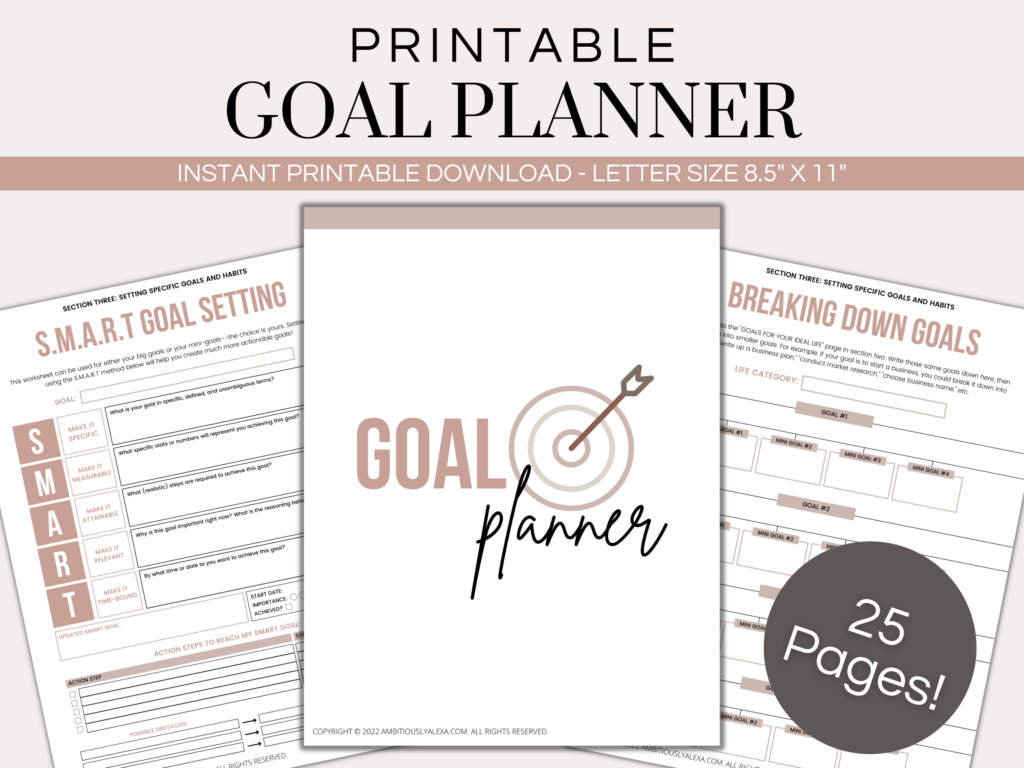35 Money Journal Prompts to Fix a Negative Money Mindset
Last Updated on October 9, 2023
“I’ll never be able to afford that”
“I’ll always be broke”
“I’m terrible with my money”
Sound familiar? If this sounds like I took the words right from your mouth, it’s because these are super common negative beliefs many of us have about money.
But here’s the thing: these are not truths. These are just beliefs. And beliefs can be changed.
We do NOT need to be stuck in an endless loop of negative money mantras and self-sabotaging financial habits. You have the power to shift your perspective, reframe negative money self-talk, and swap that scarcity mindset for one of abundance.
And it all starts with these insightful money journal prompts that will completely change the way you act, think, and feel about money. This is where you get the chance to rebuild your money mindset, ultimately leading to the financial freedom you deserve!
Financial Wellness Is an Overlooked Part of Self Care
Using journal prompts for financial wellness can help you address this often overlooked aspect of self-care. And as women, financial literacy is an absolute must for us to prioritize!
Women report feeling less knowledgeable about finances compared to men, often due to greater challenges in securing and maintaining financial well-being. With a lack of knowledge comes a lack of confidence, ultimately keeping you trapped in a negative money mindset.
We don’t want that! Luckily, these money journal prompts can change that.
When we approach money with a scarcity mindset–always in fear, waiting for the other shoe to drop and leave us broke–all we want to do is avoid the thought of money. But avoiding it won’t do you any favors.
It’s so important to educate yourself, reflect on the “how and why” behind your current money mindset, and take charge of your finances! This is especially true if you think you may have experienced financial trauma from significant financial stress at any point in your life (whether in childhood or adulthood).
Starting a Money Mindset Journal
Why use money journal prompts to transform your mindset? Having a personal space to explore your thoughts, feelings, and beliefs about money can help you learn a lot about your relationship with it.
Many of us walk around with a money scarcity mindset without even knowing it.
By giving financial journaling a try, you can identify and reframe any negative or limiting beliefs you may have about money. This is the first step in working toward the healthy, positive financial wellness you deserve. Money can be stressful at times, no doubt about it! But it doesn’t have to be this way.
If money journal prompts sound like just the thing you need right now, here’s how to start!
- Bring your fave journal and an open mind. You’ll want to ask yourself, “what events shaped the way my money mindset developed?” Exploring your financial experiences, even from childhood and the way your parents talked about and handled their finances, is crucial information!
- Outline a few financial goals, both mentally and tangibly. What do you want to get out of these money journal prompts? Do you want to approach money from a mentally healthy place? Do you want to get a more confident handle on your financial habits? Take some time to reflect on your goals and set clear intentions.
- Define how you will measure financial wellness. In what ways do you want to see your money anxieties lessen? Will you track your spending and saving patterns? Record each time you face an emotional money trigger. Think about which behaviors you’d like to improve and how you can create actionable steps to tackle them.
- Celebrate all your wins–both big and small! This is SO important. If you have big savings goals, but they feel so far away that you’re discouraged, don’t focus too hard on the destination. What small steps along the way of your financial journey can you give yourself credit for? These are great topics to journal about!
35 Money Journal Prompts for an Abundant, Money-Positive Mindset
Whether your goal is to improve your financial literacy, get your personal finances in check, achieve financial freedom, or manifest a healthier money mindset that leaves you feeling good rather than stressed, you’re in the right place! These money journal prompts contain everything you need to transform your scarcity mindset into an abundance mindset.
Don’t forget about these money journal prompts! Pin ’em to come back!

Money Mindset Journal Prompts
1. What are some of the messages you were told about money as a child?
You probably remember hearing the word “no” as a child when begging your parents for that shiny new toy.
While children should learn they can’t get everything they want, the way your parents explained this to you says a lot.
Did your parents offer age-appropriate explanations about money and costs? Or did they give you something more along the lines of “because I said so”? Or maybe even made you feel bad for having the normal “wants” most children have?
2. How did your parents react emotionally to their finances?
Your answer to this money journal prompt can set the stage for your mindset BIG TIME.
Some parents make sure to discuss financial stress in private, while others may lash out with anger and anxiety. If you grew up with a parent who reacted poorly to financial struggles, complained about bills often, or generally had a poor money mindset, it’s likely you picked up on this negative energy, too.
Consider the level of emotional maturity your parents had when it came to expressing money concerns in front of you.
3. Write about three money-related things you’re grateful for.
You’d be surprised at the difference gratitude can make in shifting your mindset from money scarcity to money abundance!
It’s all too easy to focus on the negatives. That rent payment that takes up half your income. That flat tire that cost you money you weren’t prepared to pay. The medical bill that’s way too outrageous for a 10 minute doctor’s visit…you get the picture.
But dwelling on the negatives, rather than simply accepting the negatives, won’t do you any good. Instead, reflect on three positive financial aspects of your life. Maybe it’s the raise you got, a bill that cost you less than you thought, or the interest accumulating in your savings account!
4. What emotions do YOU associate with money?
Are you at peace with the way your finances are going? Are you anxious because bills keep piling up and it feels impossible to save? Consider how these emotions affect your decisions too.
Have you ever heard the phrase “it’s expensive to be poor”? When you’re strapped for cash, or you fear that you will be…you make choices like buying the four-pack of toilet paper for $5 instead of the 30-pack for $24.
$5 sounds way less scary than $24, right? But by choosing the option that lets you be as scarce and frugal as possible, you’re only spending more in the long run compared to buying in bulk.
5. What is your relationship with debt?
Is debt something you struggle with? How does it make you feel? Do you feel optimistic about your ability to reduce your debt, or does it leave you feeling trapped?
After reflecting on the way debt impacts your mindset, write down the actionable steps you can take to better manage your debt.
6. Do you have a role model that sets a good example of a positive money mindset?
Is there someone you admire for their financial success or money habits? Maybe you have a parent or mentor that taught you all about investing, building credit, and healthy spending habits.
If you don’t have someone like that (it’s okay! Not everyone does!), envision and reflect on what you believe a positive financial role model would look like. What choices do they make? What do they do to stay accountable?
7. Does your financial status have an impact on your self-worth?
It’s easy to get caught up in the idea that our “status” indicates how successful we are, or how worthy we are. Society encourages us to boast about our status markers, like buying the latest iPhone each year, flaunting an expensive car, and buying a house before a certain age.
But remember that these things have absolutely nothing to do with who you are as a person. They don’t present your kindness. They don’t present your passion, nor your intelligence, nor the work you’ve put into becoming the best version of yourself.
Of course, believing this to be true is no easy task. Reflect on what holds you back from separating your self-worth from your financial status.
RELATED: 80+ Self Worth Affirmations to Validate Yourself
8. What’s the connection between money and happiness in your life?
Do you believe money doesn’t buy happiness, or do you think there’s more to the story than that? Does your financial situation play a big role in your level of happiness in life? Identify some ways you can adjust your money mindset to help your overall well-being!
Personal Finance Writing Prompts: Planning & Budgeting
9. List three important short-term and long-term financial goals.
Tailor these to wherever you’re at in your financial journey. These goals can be as big as buying a house in the next 5 years, or as small as making an extra $100 payment toward your debt each month. Every goal is valid!
If you’re a small business owner, you’ll wanna check out these 18 Must-Have Best Planners for Entrepreneurs to make life easier!
10. Describe the action steps you’ll take to achieve your financial goals.
A goal is nothing without a plan and solid habits in place. How exactly will you reach your goals? Which habits will you practice each week to bring you closer to your goals?
And don’t forget to add these habits and steps to your planner right now, so that you’ll actually carry them out!
11. Do you currently have a system in place for budgeting and expense-tracking?
…and more importantly, is it working for you? I’ll be honest, budgeting and expense tracking is tedious, time-consuming work! I myself am not always perfect with it. If you can relate, jot down some ways you can improve your financial management.
12. Reflect on a past financial mistake you made. What did you learn from it?
These money journal prompts are your safe space, so don’t beat yourself up for your mistakes! We aren’t born knowing how to juggle all these dollar signs after all! Trial and error is seriously inevitable, so please give yourself some compassion and grace.
All you can do is take it as a learning lesson for the future. What did you learn about yourself, your financial management habits, and the way you view money?
13. How can you prevent similar financial mistakes in the future?
Taking it a step further, how can you use what you learned from your mistake to prevent future mistakes?
Maybe your money mistake taught you to do more research before making a big purchase next time. Maybe you know you love shopping for new clothes, so you choose to cut back somewhere else in your budget.
14. What is something you want to become more financially literate about?
Not every young adult starts on the right path with the right guidance when it comes to money. When you’re young, finances are SO overwhelming. You may have no clue where to start! Especially if you didn’t get any help.
As we know, school is basically a lost cause for teaching us anything valuable about finance 🙄
So take note of the areas you could use a little more education on. Maybe it’s finding the right savings account with a worthwhile interest rate. Maybe it’s how to even step foot into retirement planning! Then, use all your free resources and get educated.
15. How would you rate your current financial literacy?
If you’ve got a long way to go, it’s okay! Being able to admit your shortcomings and assess what you do and don’t know will help you identify where to put your focus. Maybe you know exactly how to find the best high-yield savings account, but don’t know the first thing about a Roth IRA. Now you know what needs more research!
Get help on setting the right financial goals you’ll actually achieve this time!

Science says 92% of people don’t achieve their goals. After using this goal planner, it’ll be crystal clear why. (And how you can be the 8% who does!)
My Printable Goal Planner gives you the best strategy to brainstorm, plan, AND effectively achieve the right goals for your life!
Journal Prompts For Financial Freedom
16. What does it mean to be “financially free” to you?
Essentially, if you had your “ideal” financial situation, what would that look like? They say “money doesn’t buy happiness,” but does it at least buy you peace of mind? Think about what your life would need to feel truly comfortable financially.
17. If you had to take a snapshot of your current finances, what would it look like?
Take some time to look over your assets, debts, income sources, and monthly expenses. Jot down approximately where each of them are at. Do the numbers you see support your path to financial freedom? If not, what would need to change? It’s money journal prompts like these that help you re-route your habits.
18. What financial roadblocks are holding you back right now?
Maybe you had to take some time off work and now you feel like it’s set you back more than you’d like. Maybe you’re so anxious about money that you’re not giving yourself any leeway to enjoy it. What, in terms of your mindset and current situation, can improve over time?
19. Do you have any side income streams? If not, have you thought about starting some?
Having side income from one or more sources can really accelerate your path to financial freedom! There are so many side hustle ideas that can take the pressure off your finances.
For instance, this blog helped me replace my old part-time job’s income, and it’s growing closer and closer to a full-time income! With enough dedication, patience, and a willingness to learn, your side hustles can absolutely pay off.
20. Do you have any unhelpful money habits that can be improved?
If you take a look at your spending habits, is there anywhere you can cut an expense or two or reduce your spending? This is a good time to review any subscriptions you no longer use. Or, maybe you didn’t even realize you spent $300 on takeout last month!
21. Investing can be intimidating. What do you know about it and where are you at with it?
Have you avoided investing because you’re not sure where to start? Have you gotten a basic handle on it, but feel you could be learning more to optimize your money’s growth? Brainstorm an investing strategy that will get you closer to your goals.
22. Do you have an emergency fund? If so, is it sufficient?
A good rule of thumb is to have at least 3-6 months of expenses saved up in an emergency fund. If you can surpass this, that’s even better.
23. Do you have plans in place to ensure your financial stability during retirement?
Learn the difference between a Roth IRA and a Standard IRA and which will benefit you more, at the very least. Then, learn what to do inside your IRA. (401(k)s are also important to learn about if your employer offers them!).
Embarrassing story time: I opened a Roth IRA at my bank and did my monthly contributions, as you do. Problem is…I thought that was all there was to it. I thought to myself “huh? Why does this account only offer a 0.25% interest rate? How’s anyone gonna grow their retirement that way?!”
Then I realized you’ve gotta actually, uh, buy stocks, mutual funds, or index funds INSIDE THE ACCOUNT! Ugh, I know. You live and learn. No one explained this stuff to me, so I didn’t know better until I took matters into my own hands. Learn from my mistakes!
Money Manifestation Journal Prompts
24. Write down three affirmations that reinforce a positive money mindset of abundance.
These can be anything that fills you with confidence that you are capable of the financial growth you’re working on!
A few good money manifestation affirmations are…
- I am in control of my financial well-being.
- I deserve the money I earn.
- I attract all the right opportunities to benefit my financial stability.
You might enjoy my guide on how to manifest something simply by writing it down to get serious about money manifestation!
25. Close your eyes and visualize what your life will look like when you achieve financial abundance. Write down what you see and feel.
Remember, as you write, phrase your wording around the idea that you WILL achieve what you’re working for. Not IF, but WHEN. This will make your money manifestation process that much more effective. Describe in detail what kind of lifestyle you’ll have.
Self-care and financial well-being go hand in hand! Grab my FREE daily self care check-in below.
26. Identify some ways you can give back or support causes that matter to you.
Generosity and gratitude are a big part of manifestation. When you put good out into the world, you’ll often receive it back. It also makes you feel good while helping others feel good, so…win-win!
27. Reflect on your appreciation and gratitude for money itself.
Money can be a complicated and sometimes problematic thing. But there’s always two sides to every coin. Think of some of the positive ways money has enabled you to do things that add value to your life.
28. How can you start viewing money as a tool for improving your quality of life, rather than a source of stress?
The key is all in the money mindset! Yes, money can stress us all out at times. But remember, stress is not the only thing money creates in your life.
It can improve your quality of life in many ways, too! Treating yourself to something that puts a smile on your face, having the means to take proper care of yourself, saving up for high quality or reliable items…the list goes on.
Money Shadow Work Prompts
29. List the specific fears or anxieties you have about money. What are some of the root causes for these fears?
Was your fear of money passed down by your parents? Did you have something traumatic happen that threatened your financial stability? Maybe you had a difficult time adjusting to the demands of adult costs of living when you moved out at 18.
Think about the themes and patterns that trigger your money fears.
30. What are some limiting beliefs you have about money?
Is money really the root of all evil? Do you believe you don’t deserve financial success? Reflect on the ways you’ve doubted yourself and your financial abilities.
31. Have you experienced any financial traumas?
For example, growing up in an environment where your basic needs were not met can lead to significant financial trauma. Maybe you were in a financially controlling relationship. Financial trauma can happen at any age. It’s important to process and work through these challenging memories.
32. Do you compare your financial status to others?
The self-comparison trap can leave you feeling inadequate and stuck in a scarcity mindset. If you find yourself comparing their house to yours, or their amount of disposable income to yours, you take away from your own accomplishments. Reflect on the times you’ve fallen prey to social comparison.
33. Do you self-sabotage and avoid opportunities for greater financial success?
This is one of those money journal prompts that warrants some serious self-awareness. If you think financial success will always be out of reach, you might be limiting yourself without realizing it. Have you made any decisions that were fueled by fear of success?
34. Are there any unhealthy generational beliefs about money you’ve held onto?
What types of money behaviors and beliefs have been constant across generations in your family? Do you find yourself continuing the pattern without realizing the way it’s hindering you?
35. How can you align your financial goals and career with your passions?
We thrive the most when we’re doing work that fuels our passions and gives us a sense of purpose. The same is true for our financial goals too, so make sure that all of these align with your true values. You deserve to live a life of abundance that also feels right!
How To Make Financial Journaling Effective
These money journal prompts can give you a lot of insight to the way you think and behave financially. To dig deep and really assess your money mindset, financial habits, and areas for improvement, follow these tips!
- Explore what you want to get out of these money journal prompts – do you want to fix unhealthy limiting beliefs regarding money? Do you want to get serious about improving your financial situation? Whatever your goal may be, get clear on it!
- Revisit these prompts several times – money and finances go SO deep and the effects they have on us can be complex. You’ll want to reflect on these money journal prompts more than once if your goal is to see true change in your money mindset.
- Prioritize financial wellness and tangible goals – these money journal prompts are twofold: helping you cultivate a more positive approach to money AND set financial goals for success. Prioritize both as you go through these!
- Use these prompts as a starting point – take note of the new insights you learn about yourself and where you’ll go from here. Maybe these prompts helped you realize you need to gain more financial literacy in certain areas. Take action and expand your knowledge however you need!
Reshape your relationship with money using these money journal prompts
If you’re here to heal an unhealthy relationship with money, these money journal prompts give you the perfect starter tools to do so.
This is YOUR space to vent your financial fears, explore what made you develop your beliefs about money, and work toward a relaxed, content, and productive money mindset.
It’s not all about crunching numbers. It’s about rewriting your money story into a narrative that better supports your financial wellness.
From there, that’s when you can manifest and set financial goals, create the right budget, and track your spending and saving habits–all through a lens of financial abundance!
Click to learn and try the best goal setting strategy that will turn your goals into real success!
More Journal Prompts You’ll Love
70 Good Luck Affirmations For That Lucky Girl Mindset
76 Career Affirmations for Powerful Growth In Your Job
120+ Journal Prompts for Manifesting Exactly What You Want
60 Journal Prompts to Find Your Purpose When Stuck
LIKE THESE MONEY JOURNAL PROMPTS? PIN ‘EM FOR LATER!










